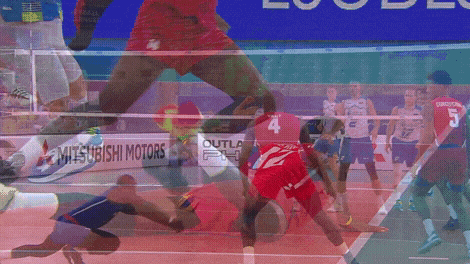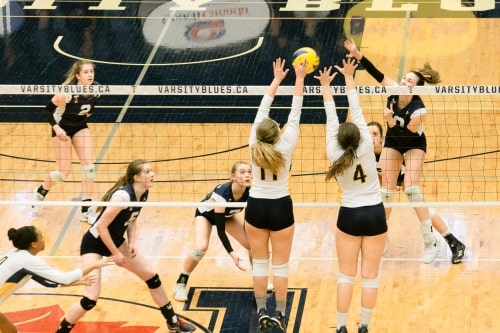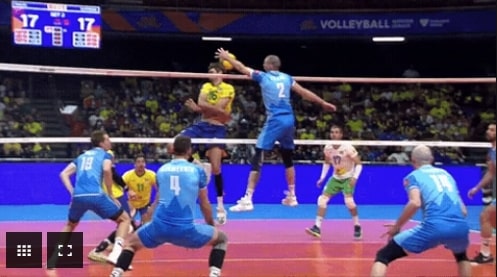Volleyball Defensive Specialist: Everything You Need to Know

When it comes to volleyball, every team member plays a crucial role, contributing to the overall success of the game. Among these team members, the volleyball defensive specialist stands out as a key player responsible for enhancing the team’s defense. In this article, we will explore the role, skills, training, strategies, and challenges faced by defensive specialists, as well as the career opportunities available in this exciting field.
What is a Volleyball Defensive Specialist?
A volleyball defensive specialist, often referred to as a libero, is a specialized position focused on defensive play. This player has unique privileges and limitations, such as wearing a different colored jersey and being able to substitute freely for back-row players. The primary role of a defensive specialist is to provide exceptional defensive skills and ball control to help their team win crucial points.
Importance of a Defensive Specialist
A defensive specialist plays a vital role in a volleyball team’s success. They are responsible for preventing the opponent’s attacks from landing on their side of the court. With their exceptional skills in digging, passing, and receiving serves, they ensure that the ball remains in play and sets up their team for a successful counterattack. Their quick reactions, agility, and anticipation make them a formidable force on the court.
Skills and Responsibilities of a Defensive Specialist
Being a defensive specialist requires a unique skill set and a deep understanding of the game. Some of the essential skills and responsibilities include:
Digging and Receiving Serves
A defensive specialist must excel in digging, which involves diving or sprawling to keep the ball off the ground. They need to react quickly to powerful spikes and redirect the ball with precision. Additionally, they must have excellent receiving skills to handle the opponents’ serves effectively.
Passing and Ball Control
Accurate passing is essential for setting up successful attacks. Defensive specialists possess exceptional ball control skills, allowing them to make precise passes even in challenging situations. Their ability to deliver a consistent and accurate pass ensures that the setter can execute the desired play.
Anticipation and Reading the Game
A defensive specialist needs to anticipate the opponent’s moves by reading the game effectively. They must analyze the opponent’s patterns, hitters’ tendencies, and potential play outcomes, enabling them to position themselves optimally for effective defense.
Quick Reflexes and Agility
In the fast-paced game of volleyball, quick reflexes and agility are paramount. Defensive specialists must react swiftly to unexpected spikes or tip shots, enabling them to make the necessary defensive plays.
Training and Practice for Defensive Specialists
To excel as a defensive specialist, rigorous training and practice are essential. Here are some key aspects of training for aspiring defensive specialists.
Technique Refinement
Defensive specialists must focus on refining their techniques to ensure optimal performance. This includes practicing proper body positioning, footwork, and arm movements for various defensive actions such as digs and receives. Regular repetition and feedback from coaches help them master these techniques.
Reaction Drills
Quick reactions are vital for defensive specialists. They engage in reaction drills that simulate game-like situations, where they must respond rapidly to incoming attacks. These drills improve their reflexes, enabling them to make split-second decisions and execute defensive plays effectively.
Footwork and Agility Training
Footwork and agility play a crucial role in a defensive specialist’s performance. Agility ladder drills, cone exercises, and plyometric training help improve their lateral movement, speed, and overall agility on the court. This enhances their ability to cover more ground and reach balls that are farther away.
Strength and Conditioning
Physical strength and endurance are essential for sustaining a high level of performance throughout a match. Defensive specialists engage in strength training exercises, such as weightlifting and resistance training, to build their muscles and improve their overall power. Additionally, cardiovascular exercises and endurance training ensure they have the stamina to withstand long and intense rallies.
Video Analysis and Study
Analyzing game footage and studying opponents’ strategies are critical aspects of a defensive specialist’s training. By reviewing past matches, they can identify their strengths and weaknesses and gain insights into the opponents’ playing styles. This knowledge helps them anticipate plays and adjust their positioning accordingly.
Defensive Strategies and Techniques
Defensive specialists employ various strategies and techniques to excel in their role. Some key approaches include:
Front-Row Defense
In front-row defense, defensive specialists collaborate with blockers to form a formidable defense at the net. They position themselves strategically to cover specific areas and create a solid block-cover system. Effective coordination and communication with the blockers are crucial for this strategy to be successful.
Back-Row Defense
In the back-row defense, defensive specialists focus on digging powerful spikes and receiving serves. They position themselves in the optimal zones based on the opponents’ hitting tendencies, enabling them to anticipate and react quickly. By making accurate digs and passes, they set up their team for successful counterattacks.
Reading the Hitter
An essential skill for a defensive specialist is reading the hitter. They analyze the hitter’s body language, arm swing, and approach to anticipate the direction and speed of the attack. This ability allows them to be in the right place at the right time for a successful defensive play.
Communication Skills
Clear and effective communication with teammates is vital in volleyball, especially for defensive specialists. They act as the primary communicator in the backcourt, providing information about the opponents’ hitting tendencies, gaps in the defense, and potential blocking strategies. This coordination ensures a well-organized defense.
Communication and Teamwork
Successful teamwork is the cornerstone of any volleyball team, and defensive specialists play a crucial role in fostering effective communication and collaboration. They act as the anchor of the defense, constantly communicating with teammates to ensure everyone is in sync. By providing timely information and support, they contribute to a cohesive and efficient defensive unit.
Equipment and Gear
Defensive specialists require specific equipment and gear to enhance their performance and safety on the court. Some essential items include:
Libero Jersey
Defensive specialists wear a distinctive jersey, often in a contrasting color, to distinguish themselves from other players on the team. This allows the referees and opponents to easily identify them during substitutions.
Knee Pads
Given the frequent diving and floor contact involved in their role, defensive specialists wear knee pads to protect their knees from injuries and abrasions. Knee pads provide cushioning and support, allowing defensive specialists to dive and slide without hesitation.
Court Shoes
Having the right footwear is essential for optimal performance and stability on the volleyball court. Defensive specialists wear court shoes with excellent traction and ankle support. These shoes enable quick movements, agile pivoting, and provide the necessary grip for sudden changes in direction.
Ankle Braces
To prevent ankle sprains and provide additional stability, some defensive specialists choose to wear ankle braces. These braces offer support to the ankle joint, reducing the risk of injuries during intense movements and landings.
Ball Retrieval Tools
During training sessions, defensive specialists may utilize ball retrieval tools to enhance their digging skills. These tools simulate different types of attacks and enable players to practice their defensive techniques more efficiently.
Famous Defensive Specialists
Over the years, volleyball has seen exceptional defensive specialists who have made a significant impact on the game. Some notable names include:
Fabí
Considered one of the best liberos in the history of volleyball, Fabí played a crucial role in the Brazilian women’s national team. Known for her exceptional defensive skills and leadership qualities, she contributed to multiple Olympic gold medal victories.
Erik Shoji
Erik Shoji, a talented defensive specialist from the United States, has gained recognition for his outstanding digging and passing abilities. He has represented the U.S. national team in major international competitions and has been instrumental in their success.
Brenda Castillo
Hailing from the Dominican Republic, Brenda Castillo is renowned for her exceptional libero skills. Her lightning-fast reflexes, precise digging, and incredible court coverage have made her one of the top defensive specialists in the world.
Career Opportunities and Pathways
For individuals passionate about volleyball and possessing exceptional defensive skills, a career as a defensive specialist offers various opportunities. Some potential pathways include:
Professional Leagues
Defensive specialists can aspire to play in professional volleyball leagues worldwide. These leagues offer a platform to showcase their skills and compete at the highest level against top teams and players.
National Teams
Representing one’s country in international competitions, such as the Olympics, World Championships, and continental championships, is a dream for many defensive specialists. National teams provide exposure to global audiences and the chance to compete against the best players from around the world.
Collegiate Athletics
Many universities and colleges offer volleyball scholarships for talented athletes. Defensive specialists can pursue their education while playing at a high level, honing their skills, and gaining valuable experience. This path can open doors to professional opportunities and networking in the volleyball community.
Coaching and Training
Experienced defensive specialists can transition into coaching roles, sharing their knowledge and expertise with aspiring players. They can work with club teams, high schools, or even at the collegiate level, helping develop the next generation of defensive specialists.

Tips for Becoming a Successful Defensive Specialist
Becoming a successful defensive specialist requires dedication, perseverance, and a focus on continuous improvement. Here are some valuable tips to excel in this role:
Master the Fundamentals
Focus on mastering the fundamental skills of digging, passing, and receiving serves. Consistent practice and attention to detail will enhance your ability to make accurate defensive plays.
Develop Anticipation
Work on developing your ability to read the game and anticipate the opponent’s moves. Study the hitters’ tendencies, analyze their body language, and position yourself strategically to make successful defensive plays.
Communicate Effectively
As a defensive specialist, communication is key. Be vocal on the court, communicating with your teammates about the opponents’ plays, gaps in the defense, and potential strategies. Effective communication fosters teamwork and ensures a cohesive defensive unit.
Focus on Fitness and Conditioning
Maintaining a high level of fitness is essential for a defensive specialist. Work on your speed, agility, and endurance through regular conditioning exercises, such as cardio workouts, agility drills, and strength training. Being physically fit enables you to react quickly and sustain your performance throughout matches.
Embrace Continuous Learning
Volleyball is a dynamic sport, with new techniques and strategies constantly emerging. Stay up-to-date with the latest developments in defensive play. Attend coaching clinics, watch professional matches, and seek feedback from experienced coaches and teammates to continuously improve your skills.
Mental Resilience
Developing mental resilience is crucial for a defensive specialist. The role can be challenging, with intense pressure and the need to make split-second decisions. Focus on maintaining a positive mindset, staying composed under pressure, and learning from both successes and failures.
Practice Game-Like Situations
To enhance your performance, practice in game-like scenarios. Simulate different game situations, such as intense rallies, powerful spikes, and unpredictable serves. This helps you adapt to the pace and pressure of real matches, improving your decision-making and defensive abilities.
Watch and Learn from Professionals
Watch professional defensive specialists in action and study their techniques and strategies. Pay attention to their positioning, footwork, and anticipation. Analyze their movements and incorporate their successful techniques into your own game.
Develop Versatility
While specializing in defense, it’s beneficial to have versatility in your skills. Work on improving your serving, setting, and attacking abilities. This not only adds value to your team but also provides a deeper understanding of the game and enhances your overall performance as a defensive specialist.
Embrace the Role
Lastly, embrace your role as a defensive specialist with enthusiasm and passion. Be the backbone of your team’s defense, leading by example with your determination and work ethic. Embrace the challenges and relish the opportunity to make impactful defensive plays.

Challenges Faced by Defensive Specialists
Defensive specialists encounter various challenges in their role. These challenges include:
Physical Demands
Being a defensive specialist requires exceptional physical fitness and endurance. The role involves constant movement, diving, and rapid reactions, which can take a toll on the body. Staying in peak physical condition is crucial to meet the demands of the position.
Mental Pressure
Defensive specialists often face intense mental pressure, as they are responsible for preventing the opponent’s attacks from scoring. This pressure can be daunting, and maintaining focus and composure is essential to make effective defensive plays.
Adaptability
Defensive specialists must be adaptable to different playing styles, opponents, and game situations. They need to quickly adjust their defensive strategies based on the opponent’s hitting tendencies and adapt to the varying dynamics of each match.
Communication and Coordination
Being the primary communicator in the backcourt requires excellent communication skills. Defensive specialists need to effectively communicate with their teammates, ensuring everyone is in sync and aware of the opponents’ plays and defensive strategies.
Dealing with Errors and Setbacks
As with any position, defensive specialists will encounter errors and setbacks. Whether it’s a missed dig or a difficult-to-receive serve, it’s important to maintain a positive mindset and quickly recover from mistakes. Learning from errors and bouncing back stronger is key to continued improvement.
Conclusion
Volleyball defensive specialists are integral to a team’s success. Their skills in digging, receiving serves, and providing solid defense contribute significantly to the overall performance of the team. Through specialized training, practice, and continuous improvement, defensive specialists refine their techniques, develop quick reflexes, and become masters of anticipation.
Effective communication and coordination with teammates, as well as the ability to read the game and adjust strategies accordingly, are crucial for defensive specialists. They serve as the anchor of the defense, providing valuable information and support to their teammates. The role of a defensive specialist requires physical fitness, mental resilience, and a passion for the game.
Aspiring defensive specialists can pursue various pathways, including professional leagues, national teams, collegiate athletics, and coaching. Through dedication, hard work, and a commitment to continuous learning, individuals can strive towards achieving their goals and making a mark in the volleyball world.
So, if you have a passion for defense and want to excel as a volleyball defensive specialist, remember to master the fundamentals, develop anticipation, communicate effectively, focus on fitness and conditioning, and embrace continuous learning. Embody the role with enthusiasm and determination, and you will become an invaluable asset to your team’s success.
FAQs
With the right training, dedication, and passion, you can embark on a fulfilling journey as a volleyball defensive specialist. Embrace the challenges, strive for continuous improvement and make your mark as a key player in the dynamic world of volleyball.
Now, get ready to step onto the court and make those crucial defensive plays that can turn the tide of the game.



